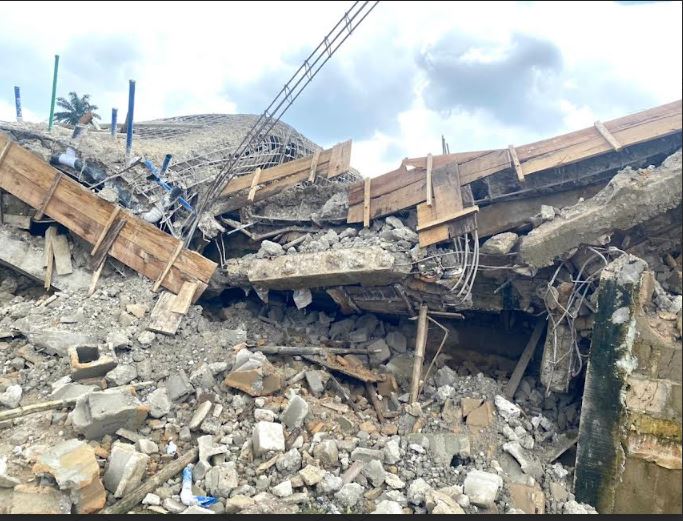Photo caption: Site of a collapse building at Iriebe in Ohio/Akpor Local Government Area, Rivers State, on Tuesday, October 29, 2024
The Building Collapse Prevention Guild has decried the number of deaths caused by building collapse cases nationwide, stating that Nigeria witnessed 1,616 deaths in 653 reported incidents of building collapse between October 1974 and May 25, 2025.
According to the Guild, Lagos State accounts for the highest number of recorded building collapse incidents in Nigeria, making up 55.28 per cent of the total.
“Following Lagos, the Federal Capital Territory (Abuja) ranks second with 4.29 per cent, while Anambra State is third with 4.13 per cent. Oyo State follows closely in fourth place at 3.37 per cent, and Kano State rounds out the top five with 3.22 per cent. Some states had their first recorded building collapse incidents only recently.
“These include Taraba, Bayelsa, Gombe, and Yobe states, all of which reported their first collapses in 2022. On the other hand, Zamfara, Taraba, Yobe, Bauchi, Bayelsa, Sokoto, Gombe, Katsina, and Kebbi states have each recorded only one incident of building collapse since records began,” it stated.
The Guild noted that there were no recorded building collapses in the years 1971, 1975, and 1981. However, the situation worsened in more recent times. Despite the COVID-19 lockdown, the year 2020 witnessed 45 building collapses nationwide, with Lagos accounting for 18 of them, representing 40 per cent of the total that year.
“The year 2022 saw the highest number of collapses ever recorded, with 62 incidents nationwide. Lagos alone recorded 20 of these, amounting to 32 per cent. In 2023, a total of 52 collapses were recorded across the country, with Lagos again leading with 17 cases, equivalent to 33 per cent of the total.
“In 2024, there were 47 building collapses reported across 14 states. Lagos again topped the chart with 13 incidents, followed by Abuja with 6, Anambra with 5, and both Kano and Rivers recording 4 each. Jigawa and Plateau had 3 incidents each, while Osun and Delta reported 2 each. Niger, Abia, Edo, Oyo, and Ebonyi states each recorded one collapse,” the Guild stated.
It added that as of 2025, 13 building collapses had already been recorded. The first incident of the year occurred in Rivers State on January 4th. Lagos continues to lead with 7 recorded incidents. Ekiti has 2 cases, while Anambra, Yobe, Rivers, and Ogun states have each reported one.
The first recorded building collapse in Nigeria took place in October 1974 in Oyo State. It involved a multi-storey building that collapsed due to excessive loading, tragically killing 27 people.
The tallest building collapse in Nigeria’s history occurred on November 1, 2021, in Lagos, resulting in the deaths of 52 people. These statistics were compiled by the Building Collapse Prevention Guild, covering incidents from 1974 to date.”
Decrying the rate of building collapse in the country, a member of the BCPG, Amuwo Cell, Lagos State, Dr Victor Oyenuga, said the frequency of collapse of building structures in Nigeria in the past few years had become very alarming and worrisome.
He said, “Many lives and properties have been lost in the collapse of buildings all over the country, and mostly in cities such as Lagos, Benin, Port Harcourt, Abuja, etc. Many property owners have developed high blood pressure, and some have been sent to their early graves over these incidents.
“A visit to the collapsed scenes was as revealing as they were pathetic, and one could not help but wonder why such precarious phenomena could have been allowed to stand or to what extent people could go to cut corners at the expense of the safety of lives and properties.”
On the consequences of building collapse, Oyenuga said it includes the loss of lives, adding that between 2016 and now, the death toll was over 200.
He said, “Consequence of building collapse are huge economic losses, huge expenditure to clear the debris, expenses to carryout due diligence to determine the causes of collapse, need for fresh soil investigations, need for re-design, if the site is still available and the Client is willing, or loss of the Site, if in Lagos State.
“Lack of confidence in the built environment professionals by the public, for lack of understanding of the matters involved, indictment of the Physical Planning Authority concerned, lack of trust in the Government for failure to act decisively, and the Client, in most cases, is the culprit.”
=== PUNCH ===



